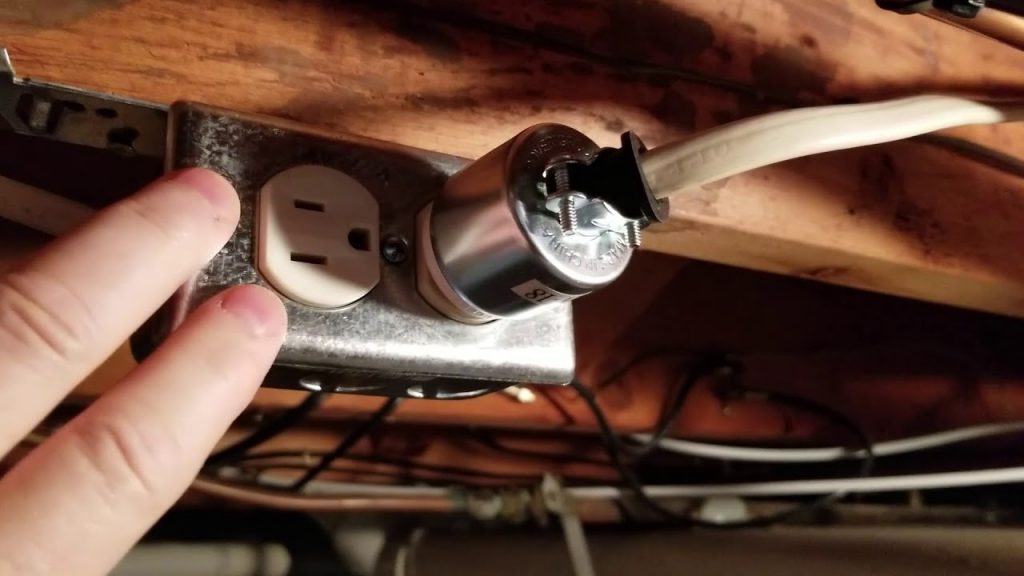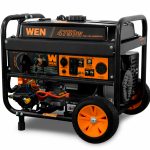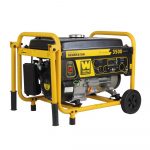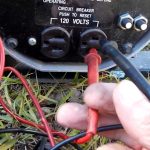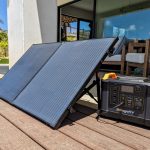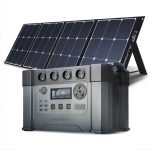If you are wondering what size generator you need to run a furnace, there are a few things to consider. Generally, you should get a generator that produces at least 5,000 watts to run a furnace. However, if you plan to run other appliances at the same time, then you may need a larger generator with more power output. When considering a generator, it is important to look at its wattage rating, as this will determine how much power it can provide. Additionally, you should consider the fuel type, noise levels, and any additional features the generator may have.
When purchasing a generator, it is important to calculate your power requirements. You should include the wattage of the furnace, plus any additional appliances you may need to power, such as a refrigerator or electric lights. Knowing your total wattage requirements can help you determine the size of generator you should purchase. It is also important to consider the type of fuel the generator uses. Some generators run on gasoline, propane, or natural gas. The fuel type should be chosen based on your individual needs and preferences. Finally, consider the noise levels of the generator. This is especially important if you plan on running the generator close to your home. Some generators are much quieter than others, so be sure to research noise levels before making a purchase. Overall, when choosing a generator to run a furnace, it is important to consider the wattage rating, fuel type, and noise levels. This will help ensure that you purchase the right size generator for your individual needs.
Can I hook my furnace up to a generator?
It is possible to hook up a furnace to a generator in order to run it. This can be a great option in the event of a power outage when the furnace needs to be in use. The generator must be the right size and power capacity to safely power the furnace. It is important to ensure that the connection is done properly, otherwise the furnace may be damaged. It is also important to check the generator’s fuel supply to make sure it can provide the necessary power to keep the furnace running. Finally, it is important to make sure the generator is properly maintained to avoid any problems with the furnace operation.
Can I use a portable generator to power my furnace?
Using a portable generator to power your furnace is possible, but not always recommended. Portable generators are designed to provide temporary power to a variety of appliances, but it’s important to note that they are not typically designed for continuous use. They may not be able to provide enough power to run your furnace consistently, and running your furnace on a portable generator could cause it to burn out quickly. Additionally, generators produce exhaust fumes, which can be dangerous to breathe in a closed environment like your home. If you decide to use a generator to run your furnace, it’s important to do your research and find one that is suited to the type of device you’re powering.
Make sure to check all safety guidelines and regulations, and only operate your generator in a well-ventilated area. It’s also a good idea to have a qualified technician inspect your furnace after it’s been powered by a generator, to make sure there’s no damage. Overall, using a portable generator to power your furnace can be done, but it’s important to be aware of the risks and take necessary precautions. Make sure to weigh your options carefully before deciding to use a generator for this purpose.
Will a 3500 watt generator run a furnace?
A 3500 watt generator can provide enough power for you to run a furnace. However, you need to ensure that the generator is powerful enough to handle your furnace’s power needs. A typical furnace requires between 2500-5000 watts to run, depending on the size and type of furnace. Therefore, a 3500 watt generator should be able to handle the power needs of most furnace models. Before connecting a generator to a furnace, you should check the manufacturer’s specifications to make sure that the generator is compatible.
If the wattage output of the generator is too low, it could cause the furnace to overheat or burn out. You should also make sure that the generator is connected to a dedicated circuit breaker. This will prevent the generator from being overloaded, which can cause it to shut off unexpectedly. Finally, you should keep in mind that a 3500 watt generator may not be sufficient if the furnace is running in extreme temperatures or for extended periods of time. In those cases, you may need a higher wattage generator or multiple generators.
What size generator do I need for a furnace and refrigerator?
If you are looking for a generator to run a furnace and refrigerator, then you will need a generator that is capable of producing enough power to run both appliances. The size of the generator you need will depend on the wattage requirements of both the furnace and the refrigerator. It is important to calculate the wattage for both appliances to determine the size of the generator you will need. For example, a furnace typically requires 5,000 to 30,000 watts depending on the model, while a refrigerator requires around 1,000 watts. Therefore, if you are looking to run both a furnace and refrigerator, you will need a generator capable of producing at least 6,000 watts. It is also important to consider other power needs the generator will be responsible for, such as lights or small appliances, as this will help you accurately determine the right size generator for your needs.
How do I keep my furnace running in a power outage?
Running a furnace during a power outage can be a challenge, but one of the best ways to do it is by using a generator to run your furnace. A generator is an independent source of power that can help you keep your furnace running during a power outage. Before you begin, make sure that the generator is properly connected to the furnace. You should also make sure that the generator is able to provide enough power to run the furnace. The next step is to turn off the power switch on the furnace.
This will ensure that the furnace is not drawing power from the main power grid. After that, you can turn on the generator and start the furnace. You should also make sure that the generator is running at the proper voltage. This is important to make sure that your furnace is running properly and safely. Finally, you should be sure to check on the furnace periodically to make sure it is working properly and not overworking. This will help you ensure that your furnace is running smoothly and efficiently during a power outage.
Do furnaces work during power outages?
The answer is yes and no. It depends on what kind of furnace you have. If your furnace runs on electricity, it will not work during a power outage. However, if you have a furnace that runs on natural gas, it may continue to work, as long as you have a generator to run the furnace. A generator can provide a temporary power supply to your natural gas furnace during a power outage, allowing it to keep running.
However, it’s important to note that generators are not designed to provide power for an indefinite period of time. Therefore, if the power outage is prolonged, the generator may not be able to keep the furnace running. It’s also important to note that running a furnace during a power outage can be dangerous. If you do not have the proper safety equipment and knowledge, you should avoid running your furnace during a power outage. In conclusion, whether or not a furnace works during a power outage depends on the type of furnace and whether or not you have a generator to run the furnace. It’s important to remember that running a furnace during a power outage can be dangerous and should only be done by knowledgeable individuals with the proper safety equipment.
Can you run a furnace on a solar generator?
Solar generators are powered by the sun’s energy, so they produce clean, renewable electricity. This allows you to heat your home without relying on fossil fuels or traditional electricity sources. Using a solar generator for your furnace is relatively simple. All you need is to install a solar panel array, connect it to an inverter, then connect it to the furnace. This will provide the necessary power to run your furnace.
The cost of a solar generator for your furnace depends on the size of the system required, as well as the efficiency of the components. Additionally, it’s important to make sure the system is sized correctly for your specific needs. This will ensure the system runs efficiently and keeps your energy bills low. The benefits of using a solar generator to run your furnace are numerous. Not only will you be reducing your reliance on traditional electricity sources, but you may also be eligible for various financial incentives. These could include tax credits, rebates, and other benefits. Overall, using a solar generator to run your furnace is a great way to save money and reduce your environmental impact. With the right setup, you can enjoy the benefits of clean, renewable energy while reducing your energy bills.
How do you hook up a generator to a furnace?
Hooking up a generator to a furnace can be a great way to ensure that your furnace stays running during a power outage. To do this, you’ll need to connect the generator to the furnace in order to provide electricity to the furnace. First, you should make sure that the generator is properly grounded and that you are familiar with the safety guidelines for working with a generator. Once this is done, you need to connect the generator to the furnace using an AC transfer switch. This switch should be wired in between the generator and the furnace, so that the generator can supply power to the furnace when the main power is out.
Next, you will need to turn off the main power supply to the furnace and then connect the AC transfer switch to the furnace. It’s important to make sure the connections are secure and that the generator is supplying power to the furnace. Once the connections are complete, you can turn the generator on and make sure that the furnace is receiving power. If it is, you can turn on the furnace and check for any signs of malfunction. Finally, once you have verified that the generator is powering the furnace properly, you can use the generator to run the furnace whenever there is a power outage. This will ensure that your furnace stays running and that you don’t have to worry about a power outage affecting your furnace.
Can you run a furnace on a generator?
A generator can be used to run a furnace, but it is important to understand the generator’s wattage capabilities and the wattage requirements of the furnace. A generator should be capable of providing enough power to start the furnace, or the furnace may not be able to start. Once the furnace is running, the generator should be able to provide enough power to keep the furnace running. It is important to note that certain safety protocols must be followed when using a generator to run a furnace. The generator should be placed in a well-ventilated area, away from flammable materials, and it should be properly grounded.
It is also important to make sure that the generator is suitable for the wattage requirements of the furnace. If the wattage is too low, the furnace may not be able to start and run properly. Finally, it is important to ensure that the generator is properly maintained and serviced to ensure that it is running efficiently and safely. With proper care and maintenance, a generator can provide reliable and efficient power to run a furnace.
Is it bad to run a generator out of gas?
Running a generator out of gas can be an extremely dangerous situation if you’re using it to power a furnace. If you run out of fuel while the generator is still running, it can cause a complete malfunction of the generator and your furnace. This could lead to a fire or other safety hazard. If you’re using a generator to power your furnace, it’s important to keep a close eye on the fuel level. Make sure you have enough fuel to last through the day or night, and then top off the tank if you need to.
Refill it before it gets to the empty mark. You should also check the fuel filter and any other parts related to the fuel system on a regular basis. This will ensure that your generator can keep running at its optimal performance. Above all, it’s important to always follow safety procedures when operating a generator. Make sure you know how to safely hook it up to your furnace, and always be aware of the potential dangers associated with running out of gas. Taking the proper precautions can help ensure that you won’t run out of fuel when you need it most. Keep an eye on the fuel levels and perform regular maintenance to keep your generator and furnace running safely.
Can I use a generator to run my appliance?
Yes, you can use a generator to run your furnace. A generator is a device that produces electrical power, typically by connecting to an external fuel source such as gasoline, diesel, or propane. Generators are commonly used to provide electricity during power outages, as a backup power source, or as a primary electrical source in remote locations. When it comes to running a furnace, the generator needs to provide enough power to meet the needs of your appliance. Generally, this means that the generator should be rated for at least the same wattage as your furnace.
It is also important to ensure that the generator can handle the start-up load of your furnace, as it takes more energy to start the appliance than to keep it running. Using a generator to power your furnace does come with some risks. Overloading the generator can cause damage to both the generator and the furnace. It is important to follow the manufacturer’s instructions for running the generator, as well as any safety precautions. If you are unsure of the wattage needed to run your furnace, or if you have any questions about generator safety, it is best to consult an expert. An electrician or a generator technician can provide advice and help you make sure that you are using your generator safely and properly. Overall, it is possible to use a generator to run your furnace, but make sure to follow all of the safety precautions and use the right size generator for your appliance. If you are unsure, it is best to consult an expert.
Can I run my furnace with a portable generator?
Running your furnace with a portable generator can be a great way to keep warm during a power outage. However, it is important to make sure your generator is able to produce the amount of power required to run your furnace. Most portable generators are rated according to the amount of power they can produce. To determine if your generator is powerful enough to run your furnace, look for the wattage rating of your furnace. Then, compare that to the wattage rating of your generator.
If your generator is rated at or above the wattage requirement of your furnace, then it should be able to successfully power your furnace during a power outage. Additionally, you should make sure your generator is hooked up to your furnace safely, with all of the necessary safety procedures taken. Once your generator is hooked up, it is important to run your furnace in short intervals, as running it for extended periods of time can put a lot of strain on your generator. Also, make sure to check the oil and fuel levels of your generator regularly, and keep it as far away from your house as possible to avoid any potential danger. Overall, running your furnace with a portable generator during a power outage can be a great way to keep your family warm and comfortable. However, it is important to make sure you take the appropriate steps to ensure your generator is powerful enough and connected safely before running your furnace with it.
How big of a generator is needed to run a furnace?
Choosing the right size generator to run a furnace can be a tricky task. In order to determine the correct size generator, you need to know the wattage of the furnace. Most furnaces use a maximum of 5000 watts when running. It is important to factor in the start-up and running wattage, as it will be different. The start-up wattage is usually three times higher than the running wattage.
Therefore, a generator that can provide a minimum of 15000 watts is recommended. It is also important to consider the generator’s wattage output when selecting a generator to power a furnace. A generator with a wattage output of at least 20,000 watts is recommended in order to ensure that the furnace is powered properly. Finally, it is important to take into account the type of fuel the generator runs on. Most generators have an internal combustion engine, so it is important to make sure that the fuel is readily available in the area and that the necessary fuel storage facilities are available. Overall, when purchasing a generator to run a furnace, you should take into consideration the wattage of the furnace, the wattage output of the generator, and the type of fuel the generator needs. By doing so, you can ensure that your furnace is powered properly and safely.
How big of a generator do I need to run a gas furnace?
Figuring out what size of generator you need to run a gas furnace can be a complicated process. The size of generator you need to power a gas furnace depends on many different factors, such as the size of the furnace, the type of fuel it runs on, and the electrical load it requires. Generally speaking, if you are powering a gas furnace with a generator, you will need a generator with a wattage between 6,000 to 12,000 Watts. However, if you plan to power other items in your home alongside the furnace, you may need a generator with a higher wattage to ensure that all the power requirements are met. When shopping for a generator to run your furnace, it is important to look for one with enough wattage to support its operation, as well as any additional items you may need to power.
Additionally, you will want to make sure the generator has an overload protection feature, as it will help prevent damage to the furnace caused by overloading the generator. Finally, make sure you choose a generator that is compatible with the type of fuel your furnace runs on. Most generators are equipped to run on either propane or natural gas, but you should double-check before purchasing to make sure it is compatible. When in doubt, it is always best to consult a professional to ensure that you select the right generator to power your gas furnace. By following these steps, you can ensure that you are getting a safe and reliable generator that will keep your furnace running smoothly.
How much does it cost to run a portable generator?
Running a portable generator to power a furnace can be a cost-effective solution to provide heating during power outages. The cost of running a portable generator varies depending on the size and type of generator, as well as the amount of energy required to run the furnace. Generally, a small generator can cost between $200 to $500 to purchase, while a larger generator can cost up to $1,500 or more. In addition to the purchase cost, the running cost of a portable generator will depend on the amount of fuel required and the cost of the fuel. Generally, it costs around $0.10 to $0.30 per kilowatt-hour to run a portable generator.
This means that if the generator is powering a furnace, it will require a large amount of energy to generate the heat. Thus, the running cost of the generator can be quite high. The cost of running a portable generator to power a furnace will also depend on the frequency of use. If the generator is used regularly, the cost of fuel will increase over time. On the other hand, if the generator is only used occasionally, the cost will be much lower. Finally, the cost of maintenance should also be taken into account when calculating the cost of running a portable generator. Regular maintenance can help ensure the generator lasts longer and runs more efficiently. This can help to reduce the cost of running the generator in the long run. In conclusion, the cost of running a portable generator to power a furnace can vary significantly depending on the size and type of generator, the amount of energy required, the cost of fuel, the frequency of use, and the cost of maintenance.
Should I buy a portable generator?
If you are considering buying a portable generator to run your furnace, it is important to first assess your individual needs. Consider what size generator you need as well as the total wattage needed to power your furnace. You should also think about how frequently you will be using the generator and what type of fuel it requires. It is also important to consider the cost and the noise level of the generator. Portable generators can range in price and the more powerful the generator, the higher the cost.
Additionally, portable generators can be quite noisy and may not be suitable for all living environments. Finally, you should think about the convenience factor. Portable generators are great for emergencies and can provide power for a few hours, but they may not be suitable for long-term needs. In addition, they can be quite heavy and difficult to move around. Overall, the choice to buy a portable generator to run your furnace is a personal decision. Be sure to do your research and assess your individual needs to make the best decision for your situation.
What is the best portable generator?
Portable generators are compact, which makes them easy to transport, and they are also easy to install. Most portable generators are powered by gasoline, which is readily available and can run for long periods of time. Some portable generators also come with inverters, which convert the engine’s alternating current (AC) into the direct current (DC) necessary to start and run the furnace. These generators are also relatively quiet and produce less emissions than larger stationary generators. With the right model, a portable generator is a great choice for running a furnace during power outages or other emergency situations.
